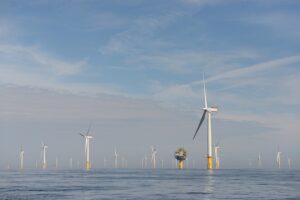Despite the absurdity and mountain of adversity that was 2020, corporations around the globe purchased a record 23.7GW of clean energy, led by the United States with companies purchasing 11.9GW.
Leading energy analysts Bloomberg New Energy Finance (BNEF) published its 1H 2021 Corporate Energy Market Outlook on Tuesday, which tracks clean energy Power Purchase Agreements (PPAs) around the world.
The report revealed that clean energy contracts were signed by more than 130 companies around the world from sectors ranging from oil & gas to big tech, driven by increasing stakeholder interest in corporate sustainability and expanding access to clean energy, according to BNEF.
“Corporations faced a wave of adversity in 2020 – internal corporate functions were disrupted on the outset of the pandemic, and many companies saw revenues plummet as global economies buckled,” said Kyle Harrison, BNEF senior associate and the lead author of the report.
“Question marks before – and after – the U.S. election further complicated long-term decision-making for companies. To not only maintain, but grow, the clean energy procurement market under these conditions is a testament to how high sustainability is on many corporations’ agendas.”
As it has for some time, the United States was the largest corporate clean energy purchaser, even though it was less dominant than previous years – highlighting both the uncertainty of the year as well as the increasing attractiveness of clean energy in other markets.
Companies in the United States signed 11.9GW of corporate PPAs in 2020, down from 14.1GW in 2019 – the first year-on-year drop in the country since 2016.
Unsurprisingly, the first half of 2020 was particularly subdued, with companies announcing only 4.3GW worth of corporate PPAs over the first six months of the year.
Figure 1: Global corporate PPA volumes, 2010-2020

Latin America, hit hard by the global COVID-19 pandemic and subsequent economic downturn, similarly saw a subdued year with PPAs signed dropping to 1.5GW in 2020 from 2GW in 2019.
However, out of the regional downturn a bright spot appeared, as companies in Brazil signed a record 1,047MW worth of corporate PPAs, with numerous companies migrating to the country’s free market where they are able to sign bilateral clean energy contracts directly with developers.
Mexico, on the other hand, once the region’s main draw for corporate PPAs, saw any deals virtually disappear in the wake of the current administration’s efforts to undermine the country’s clean energy sector.
Conversely, while the United States and Latin America saw downturns in their corporate clean energy purchasing, the same could not be said for the Europe, Middle East, and Africa (EMEA) region, which saw its corporate volumes nearly triple, from 2.6GW in 2019 to a record 7.2GW in 2020.
Spain led the way, with companies announces PPAs for 4.2GW of clean energy – up from only 300MW in 2019 – driven in large part by Spanish solar and wind projects which boasted some of the cheapest and most competitive prices in Europe, thanks to strong natural resources and a large pool of experienced developers.
Meanwhile, companies like French oil & gas major Total and Belgian brewer Anheuser-Busch InBev are orchestrating “cross-border” virtual PPAs in Spain, buying clean energy in Spain to offset their load elsewhere in Europe.
The Asia Pacific region also saw record corporate PPAs signed, with contracts for 2.9GW worth of solar and wind signed. Taiwan established itself as a major corporate clean energy market, with companies signing an impressive 1.25GW.
Taiwan’s corporate leadership will likely continue to grow, following the country’s new policy which will require companies with an annual load over 5MW to buy clean power.
BNEF expect South Korea to be the next major corporate procurement market in Asia, with policymakers currently revising the country’s Electric Utility Act to create a PPA mechanism and a green tariff program with Korea Electric Power Corporation.
“More than ever before, corporations have access to affordable clean energy at a global scale,” said Jonas Rooze, lead sustainability analyst at BNEF.
“Companies no longer have an excuse for falling behind on setting and working towards a clean energy target.”
Unsurprisingly, therefore, global online retailer Amazon was the leading purchaser of clean energy in 2020, announcing 35 new clean energy PPAs totalling 5.1GW, increasing the company’s total purchased clean power to 7.5GW, jumping ahead of rivals Google (6.6GW) and Facebook (5.9GW) as the world’s largest clean energy buyer.
Meanwhile, Total follows with 3GW, Taiwanese semiconductor manufacturer TSMC has 1.2GW, and US telecom Verizon has 1GW.
Figure 2: Top corporate clean energy buyers, 2020

The rising numbers of companies signing corporate clean energy PPAs is reflected in the number of new companies making clean energy commitments, demonstrating the market’s interest in and support of sustainability and clean energy.
A total of 65 new companies joined the RE100 initiative in 2020 – with membership reflecting their commitment to offset 100% of their electricity consumption with clean energy – with BNEF expecting that the 285 RE100 members will collectively need to purchase an additional 269TWh of clean electricity by 2030 to meet their RE100 goals.
Further, if this shortfall were to be accomplished solely through the use of corporate PPAs, it would catalyse an estimated 93GW of new solar and wind.
“Investor interest in sustainability is sky high, with inflows to sustainability-focused funds growing 300% between 2019 and 2020,” said Harrison.
“Companies in all sectors, including hard-to-abate ones like oil & gas and mining, are feeling the pressure to purchase clean energy and decarbonize. This group is only just scratching the surface on the amount of clean energy build it can catalyse.”










